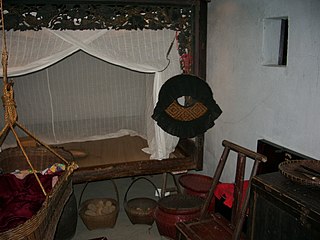
Yue is a branch of the Sinitic languages primarily spoken in Southern China, particularly in the provinces of Guangdong and Guangxi.
Gweilo or gwailou is a common Cantonese slang term for Westerners. In the absence of modifiers, it refers to white people and has a history of racially deprecatory and pejorative use. Cantonese speakers frequently use gwailou to refer to Westerners in general use, in a non-derogatory context, although whether this type of usage is offensive is disputed by both Cantonese and Westerners.

Xinhui, alternately romanized as Sunwui and also known as Kuixiang, is an urban district of Jiangmen in Guangdong, China. It grew from a separate city founded at the confluence of the Tan and West Rivers. It has a population of about 735,500, 98% of whom are Han Chinese and many of them speak a dialect of Cantonese as their first language. Xinhui is best known in China for its chenpi, a kind of dried Mandarin orange peel.

Gaoyao, alternately romanized as Koyiu, is an urban district of Zhaoqing in western Guangdong, China. Its population in 2020 was 741,591.

Hong Kong English is a variety of the English language native to Hong Kong. The variant is either a learner interlanguage or emergent variant, primarily a result of Hong Kong's British colonial history and the influence of native Hong Kong Cantonese speakers.

Shanghai Grand, also known as Shanghai Grand 1996 to differentiate this film from the more illustrious 1980 television series of the same Chinese title, is a 1996 Hong Kong action crime drama film directed by Poon Man-kit and starring Andy Lau, Leslie Cheung, and Ning Jing.
Diu is a common profanity in Cantonese. It can be regarded as the Cantonese equivalent of the English fuck.
Mo lei tau is a type of slapstick humour associated with Hong Kong popular culture that developed during the late 20th century. It is a phenomenon that has grown largely from its presentation in modern film media. Its humour arises from the placement of surprising and incongruous elements, and the complex interplay of cultural subtleties. Typical constituents of this humour include nonsensical parodies, juxtaposition of contrasts, sudden surprises in spoken dialogue and action and improbable and deliberate anachronisms.

Written Cantonese is the most complete written form of a Chinese language after that for Mandarin Chinese and Classical Chinese. Written Chinese was the main literary language of China until the 19th century. Written vernacular Chinese first appeared in the 17th century, and a written form of Mandarin became standard throughout China in the early 20th century. Cantonese is a common language in places like Hong Kong and Macau. While the Mandarin form can to some extent be read and spoken word for word in other Chinese varieties, its intelligibility to non-Mandarin speakers is poor to incomprehensible because of differences in idioms, grammar and usage. Modern Cantonese speakers have therefore developed new characters for words that do not exist and have retained others that have been lost in standard Chinese.

Punti is a Cantonese endonym referring to the native Cantonese people of Guangdong and Guangxi. Punti designates Weitou dialect-speaking locals in contrast to other Yue Chinese speakers and others such as Taishanese people, Hoklo people, Hakka people, and ethnic minorities such as the Zhuang people of Guangxi and the boat-dwelling Tanka people, who are both descendants of the Baiyue – although the Tanka have largely assimilated into Han Chinese culture.

Profanity in Mandarin Chinese most commonly involves sexual references and scorn of the object's ancestors, especially their mother. Other Mandarin insults accuse people of not being human. Compared to English, scatological and blasphemous references are less often used. In this article, unless otherwise noted, the traditional character will follow its simplified form if it is different.
Hong Kong Cantonese is a dialect of Cantonese spoken primarily in Hong Kong. As the most commonly spoken language in Hong Kong, it shares a recent and direct lineage with the Guangzhou (Canton) dialect.
The five most common Cantonese profanities, vulgar words in the Cantonese language are diu (屌/𨳒), gau (㞗/𨳊/鳩), lan (𡳞/𨶙/撚), tsat (杘/𨳍/柒) and hai (㞓/屄/閪), where the first ("diu") literally means fuck, "hai" is a word for female genitalia and "gau" refers to male genitalia. They are sometimes collectively known as the "outstanding five in Cantonese" (廣東話一門五傑). These five words are generally offensive and give rise to a variety of euphemisms and minced oaths. Similar to the seven dirty words in the United States, these five words are forbidden to say and are bleep-censored on Hong Kong broadcast television. Other curse phrases, such as puk gai (仆街/踣街) and ham gaa caan (冚家鏟/咸家鏟), are also common.

A Hero Never Dies is a 1998 Hong Kong action crime drama, and the first Milkyway Image film to be directed by Johnnie To.
Xinxing County, alternately romanized as Sunhing, is a county of the prefecture-level city of Yunfu in the west of Guangdong province, China.

King Maker is a Hong Kong historical-fiction television drama serial produced by TVB under executive producer Leung Choi-yuen. King Maker started its broadcast on Hong Kong's Jade and HD Jade channels on 13 August 2012.
Slang in Hong Kong evolves over time, and mainly comprises Cantonese, English, or a combination of the two.
Cantonese Internet Slang is an informal language originating from Internet forums, chat rooms, and other social platforms. It is often adapted with self-created and out-of-tradition forms. Cantonese Internet Slang is prevalent among young Cantonese speakers and offers a reflection of the youth culture of Hong Kong.

Smooth Talker is a 2015 Hong Kong romantic comedy television drama created and produced by TVB, starring Joe Ma and Kate Tsui as the main leads, with Johnson Lee, Elena Kong, Tommy Wong and Tracy Chu in main supporting roles. Filming took place from Augusts till November 2014. The drama aired on Hong Kong's Jade and HD Jade channels March 30 till April 24, 2015 every Monday through Friday during its 9:30-10:30 pm timeslot with a total of 20 episodes.










